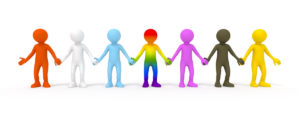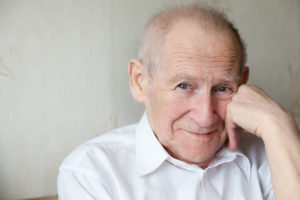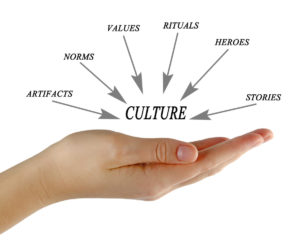
In part I of this three-part series, (How Therapy Can Help You Age Gracefully: A Guide for Gay Men (Part I: Emotionally and Physically), we looked how therapy can help gay men age gracefully from the emotional and physical points of view. Today, I’d like to share two new aspects of how therapy can support a healthy aging for gay men, which is socially and culturally.
Socially
I think the longer I do therapy for gay men (24 years now), the stronger my opinions get! This is because I keep seeing the same patterns in clients, over and over, of what they are doing when things aren’t going well (and they feel bad or frustrated with their life), versus what they’re doing to help them feel good. For example, my clients who are the happiest overall seem to have a whole series of relationships going concurrently in their lives, especially with different kinds of friends (or colleagues). A healthy aging involves having those ongoing, interpersonal, social relationships with people who are both younger and older than we are, in addition to peer relationships. Each one is important, and here’s why:

Younger Friends
When you have friends who are younger than you are, they remind you of where you were at a different phase of life (sometimes making you glad we’re older and out of that earlier period of your life!). Younger friends can be a resource of news and perspectives on the very hip and up-to-date, from music trends to electronics, to where the popular restaurants or hangouts are, and even what’s happening in sexual trends. They can make you feel validated and proud of your own accomplishments when they ask you for advice or guidance, and you can feel good helping others as well as realizing that you really have had – and then solved – a number of challenges in your life already, in your personal life and in your career. There is an energy, vitality, and hope in younger people that can be a joy to be around. Plus, they can pretty up the place with some good esthetics of great clothes, haircuts, and bodies.

Older Friends
When you have friends who are older that you are, that can inspire when you hear advice from them on how they handled certain challenges in their life (from relationships, to careers, to finances, to health issues). It’s nice knowing that you don’t have to “re-invent the wheel” with things; you can ask older friends what they’ve learned about any challenge you have, and they often have a “how it was resolve in the end” kind of perspective (from their own life, or someone they knew). You also get the “real deal” on certain historical events. While the history books (or films) might have one perspective, people who have “been there” can have another. I learned so much about the history of gay life in America from my mentor, the late gay/poz therapist and author Michael Shernoff, LCSW, when he told me what sex was like for gay men in the 70’s in New York (and what the documentary, “Gay Sex in the 70’s”, left out!). No history book is going to go into that kind of explicit detail, but older friends can. The key is to listen to them. For older people, including older gay men, they have so much good advice and perspective and yet so few people bother to ask. Older people, in general, like to be asked their opinion and the implied respect and validation that comes with that. If you don’t have older friends, get some! For the older friends who look, feel, and just generally “are” good, take notes on how they did it and do the same. For older people whom you don’t respect or admire, try to make a note of what “not” to do in the aging process, such as ignoring your health, adopting cynical attitudes, failing to be flexible/resilient, or indulging bad habits. If you use role models for what you want to evolve into, you’re more likely to be where you want to be.
How Therapy Helps Socially with Aging
The role of therapy in helping you age gracefully socially can include my helping you to gain access to the resources you need for the goals you have. Getting referred to a therapy group or to a social group can help prevent isolation over time. Having the opportunity to see what your social barriers are, such as social anxiety, shyness, body image issues, or even panic/agoraphobia can be a help. Talking about what kinds of people you want to surround yourself with – and how to set limits with people you don’t want – can empower your social life to be how you want it. Getting coaching on assertive communication or anger management, or cognitive therapy to improve self-esteem, can also help. So can getting help on being clear on what you will and will not do regarding alcohol (or other substances) in a social setting. Unlike most other mental health professionals, Clinical Social Workers (like me) also tend to help you identify, access, participate in, and evaluate various community resources (like clubs, groups, doctors, supportive services, etc.) and make practical referrals. Therapy can even be a place to “role-play” certain social skills, such as asking someone out on a date or having a job interview. Being where you want to be socially involves skills that can be taught, at any age.

Culturally
Therapy can support aging gracefully culturally as well. The older we get, the more we have to observe and somehow respond to the changes around us, such as new fashions, music, technology, and generational issues in the workplace. Some of my clients have talked about supervising a “millennial” in the workplace (my associate clinician, Amanda Jablon, MSW, ACSW, specializes in working with millennials on various quality-of-life issues, more on her services here). Or, some of my younger clients have discussed being supervised by a “Gen X”, “Gen Y”, or “Baby-Boomer” boss. Therapy can help you process changes around us in the general zeitgeist, like attitudes, priorities, and popular culture.
In clinical social work, we look at the “Person in Environment” theory. This means that as you age, and there changes in you, there are also changes around you in your local culture that you really can’t control (try as we might, sometimes). Healthy aging means not only dealing with your own emotional self, physical self, and social self, but doing it all in a cultural context of the time and place in which you live. Today’s 60-year-olds are not the same as 60-year-olds from 50 years ago, in part because we have learned more about many things in healthy aging, and today’s 60-year-olds, in general, have a better time of it.

How Therapy Helps Culturally with Aging
Therapy can help you adjust to changing culture over time by assisting you in “processing” (talking in an especially emotionally and psychologically meaningful way) the loss of your youth-era culture (the song, “1985″”, by Bowling for Soup, is a great exploration of this, as is “Glory Days”, sung by Bruce Springsteen, or even “The Way We Were”, sung by Barbra Streisand.) A therapist can use a technique called Motivational Interviewing to help you decide what changes you want to make, and why, and how to sustain them. Cognitive Therapy can help you confront and challenge your own negative beliefs about the world changing around you, and give you new points of view and more positive substitute thoughts that help you cope with it all. A therapist can also coach you on “coping mechanisms”, which are different ways to handle situations you find challenging, including learning how people with similar problems to yours dealt with them in the therapist’s previous work experience (which is why it can be advantageous to see an older therapist with a lot of experience with gay male clients).
When you receive support for the social and cultural aspects of healthy aging, you understand that you are not alone, but are part of a history of time and place, and that you have a unique and important role in it. This work can give meaning and purpose to every phase of life.
We will conclude this three-part series in the next article, which is how therapy can help gay men age gracefully domestically and financially, coming soon. Share these articles with friends and others who might find them helpful.
For more information on my therapy and coaching services, whether in person in Los Angeles/West Hollywood, or via phone or webcam, call/text 310-339-5778, or email Ken@GayTherapyLA.com.

